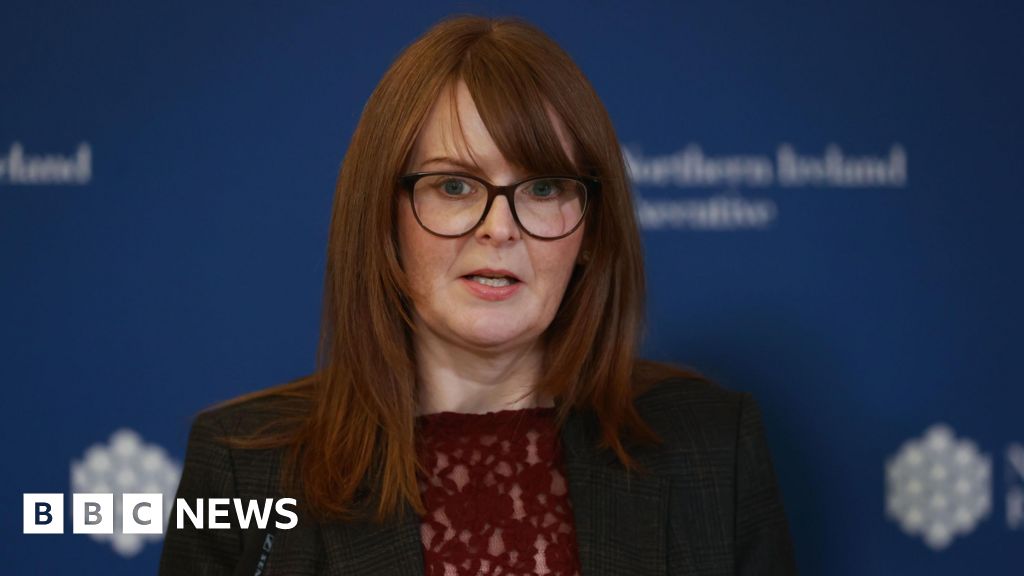BBC News NI
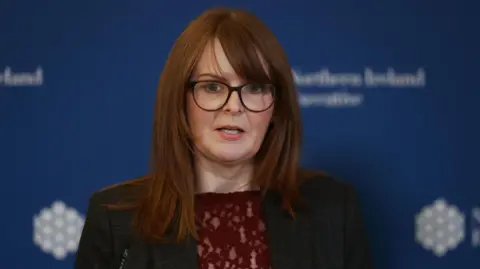 PA Media
PA MediaCaoimhe Archibald has been appointment Economy minister in a Sinn Féin Executive reshuffle following Conor Murphy’s resignation.
Former Infrastructure minister John O’Dowd is to fill Archibald’s previous brief of minister of finance, and his previous job will be filled by Liz Kimmins.
Murphy stepped down from Stormont after being elected to the Seanad (Irish parliament’s upper chamber).
Sinn Féin president Mary Lou McDonald said she was very confident in the team and said that Archibald would “lead” on correcting what she called the “underfunding” of Stormont.
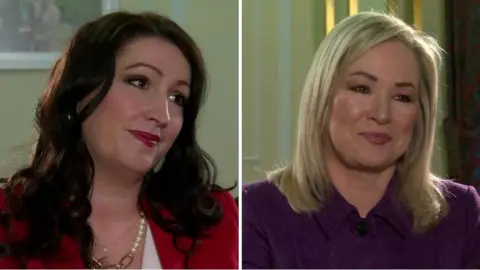
Speaking on the anniversary of the return of the Stormont institutions on Monday, First Minister Michelle O’Neill and Deputy First Minister Emma Little-Pengelly said the Northern Ireland Executive had achieved “significant” progress.
But they added there is “much more to do” to improve public services.
O’Neill told BBC News NI the four-party coalition is doing its best and must put its “shoulder to the wheel”.
Little-Pengelly said big issues like health waiting lists were never going to be eradicated in one 12-month period.
“But we’ve made a really strong start,” she added.
Devolved government was restored at Stormont exactly 12 months ago after a two-year gap due to a stand-off over post-Brexit trade rules.
O’Neill said they had made “huge strides forward” including securing nearly £500m in extra funding for public services and settling public sector pay disputes.
“We have prioritised investing in our public sector workers by ensuring their pay awards were made, that was a day one priority and we’ll continue to do so.”
The first minister added that the situation in health was not acceptable but does not believe the executive had ‘”left it all” to the health minister.
“We know this is an area that will require significant investment and that’s why it has got over half of the budget” she added.
O’Neill said the challenges in the health system have existed for a long time and described the situation as “trying to turn a tanker”.
Little-Pengelly said the executive needs “a plan” from the Department of Health to tackle the problems.
“It is the case we can’t continue to spend as we do, if we are prioritising health, we need that plan from health.”
The deputy first minister added that the shortened term of this assembly was always going to be a “challenge”.
She said prioritisation was essential and that was evident in the draft programme for government which focused on the issues that matter most to people.
O’Neill responds to ‘glorifying terrorism’ claim
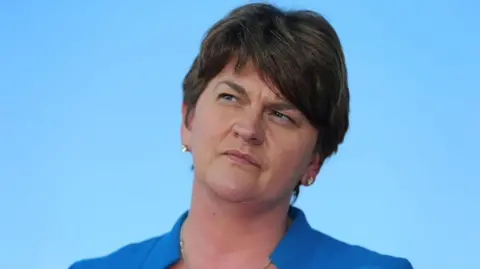 PA Media
PA MediaO’Neill was asked how she felt about a call from her predecessor, Baroness Arlene Foster, for her to be prosecuted if she attends future IRA commemorations.
Baroness Foster, a former leader of the DUP, accused O’Neill of “glorifying terrorism” over her attendance at a recent event in Magherafelt.
It commemorated three IRA members who died in 1971 when the bomb they were driving exploded prematurely.
Foster told the House of Lords that a change in the law was needed “to deal with those in authority who continue to exalt and deify terrorists”.
O’Neill replied: “I don’t agree with Arlene Foster’s assertion.
“I think that it’s important that we’re all respectful of everybody that’s lost [loved ones during the Troubles].
“We’ve a very complicated and difficult past but let’s try to be respectful of each other.”
O’Neill also said becoming the first Irish republican to hold the post of first minister “in a state that was designed to ensure that that was never the case” was still highly significant in the public’s minds.
She insisted she would continue to keep her promise to be “a first minister for all”.
A growing friendship?
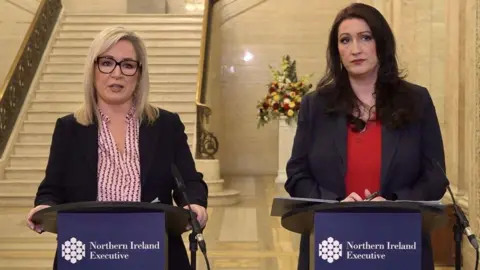 David Young/PA Wire
David Young/PA WireAfter a year in office together, O’Neill and Little-Pengelly were also asked about their own personal relationship – specifically if they now considered themselves as “friends”.
“Yes I think we are. I mean, I think we’ve got a very challenging job,” O’Neill replied.
Little-Pengelly added: “As we said from the outset, we’re very different people with very different views.
“There are things that we won’t agree on… but I think the key thing is that we are determined to deliver for people.
“This is a professional working relationship and I think we work very well together and we will continue to do that,” the deputy first minister added.
O’Neill said their recent response to Storm Éowyn was a good example of “the importance of having a locally-elected assembly and executive in place”.
It was the first time a red weather warning – the highest level of safety alert – was issued across the island of Ireland and it led to unprecedented power cuts.
“I think Emma and I certainly tried to lead from the front in terms of the storm response and I’m very pleased with that,” O’Neill said.
At its peak, 30% of all premises in Northern Ireland had their power disconnected but O’Neill said she believed that figure was now down to “about 400 people”.
She added that both she and the deputy first minister advocated strongly for customers to be compensated for financial losses during the prolonged power cuts.
“This is something that NIE and Utility Regulator needs to work out and then approach the Department of Economy in terms of any legislative change that’s required,” she said.
Marks out of 10?
The leader of the opposition, Matthew O’Toole from the the Social Democratic and Labour Party (SDLP) said there had been little “meaningful change” in the past year.
“The executive will look for bunting and birthday cards for an anniversary but they’ve been marking time rather than making progress,” he said.
“I would struggle to give them a three or four out of 10.”
